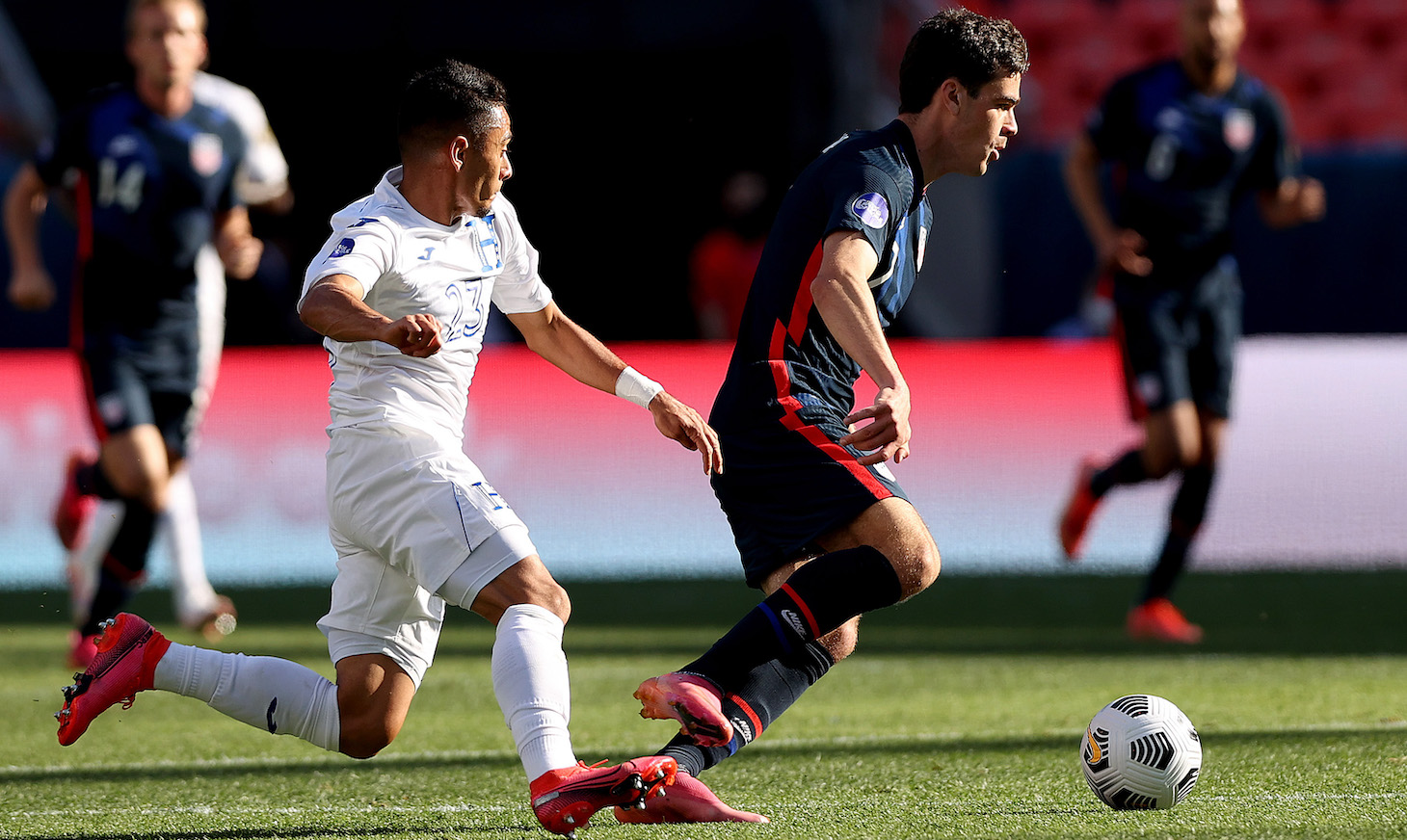On Thursday night, the USMNT made its long-awaited return to competitive play. The match, against Honduras, ended in a 1–0 victory for the Americans, which, because the game was part of the Nations League tournament, won the team a spot in Sunday's final. All of that—the match being the first meaningful one in ages, it ending with a win, the win getting the team into the final—mostly just obscures the fact that the U.S.'s performance was awful.
There was plenty of excitement in finally getting to see our boys play a match with even nominal stakes for the first time since the pre-COVID days of November 2019, which was only ratcheted up when the starting lineup dropped. Christian Pulisic, Gio Reyna, Weston McKennie, Sergiño Dest, John Brooks, Zack Steffen—the XI featured almost every single one of the talented, mostly young studs American fans have been going gaga over for the past couple years. In fact, excepting the presence of Jackson Yueill and Sebastian Lletget, you could make the case that Thursday's lineup was very nearly the coolest and strongest one the U.S. can put out. Unfortunately, pre-match fantasies about all the cool shit these guys might do coming off their silver-paved runs in Europe this season gave way to a far less glittering reality after the opening whistle.
The match, again, was awful. Not completely awful, mind, especially not in the first 30 minutes or so. In those early goings, there were a few moments when Pulisic or Reyna—the latter was easily the best American attacker on the pitch last night—would get loose, twist their way through the Honduran defense with some pretty dribbling and a couple nifty one-twos, and come close to scoring, thus demonstrating how good they are individually and how close the team is becoming something legitimately scary. But outside of those brief spells, the experience of watching the game was frustrating.
In spite of having nearly two-thirds of the match's possession, the USMNT was completely incapable of controlling the game. Too much of that possession came from the defenders idling on the ball, unable to find a way to incrementally progress it and the team up the pitch. That meant, unless one of the attackers dropped off the forward line to open a passing lane centrally or Brooks (who was actually the U.S.'s best passer) raked a long pass out to the flanks, the U.S. had a hard time getting to and staying in the final third. Defensively, too, the U.S. was far from solid, and while the Hondurans lacked creative firepower, once they'd nick the ball off the Americans they were often only a pass or two away from sprinting into wide open space on the counter.
The culprit for the U.S.'s attacking and defensive woes was the midfield. Yueill, Lletget, and even McKennie were bad. Yueill was the worst of the bunch, and appeared to be literally good for nothing. When the U.S. had possession, he just kind of stood around in the holding midfield zone, making it exceedingly easy for Honduras to simply plant a guy in that same zone and completely mark Yueill out of the game. Somehow he was even worse when he did get the ball, since his own passes were almost uniformly poor: often over-hit, not placed well, and too conservative to take advantage of the movement of the players ahead of him. All of that might have been forgivable if Yueill was some ace destroyer, but no; outside of a couple tackles when everyone was packed inside the box, Yueill looked overwhelmed when Honduras came at him, and Brooks several times had to charge forward to make the kind of challenge you'd expect the defensive midfielder to be in position for.
In Yueill's slight defense, his midfield teammates didn't offer much help. McKennie and Lletget spent most of the match playing way far ahead of Yueill, almost as auxiliary forwards. The distance between the two advanced mids and the holding one was enormous, which made Yueill's attempts to link the defense to the attack more difficult. In the other direction, with two of the three central midfielders playing so far forward, the U.S. left the area of the pitch in front of the defenders unprotected, which is why Honduras had such an easy time getting free on the counter. By performance, tactics, and talent, the midfield was set up to fail the far superior attacking and defensive lines, and that, more than anything else, is why the U.S. didn't impress.
But while Yueill and Lletget probably aren't good enough to play major roles for the kind of USMNT fans want to see, it's not really fair to blame them for that. Instead, the real fault lies with the manager, Gregg Berhalter. It was Berhalter who decided to hand starts to the pair of MLSers, a confusing decision in light of the fact that two direct upgrades were available on the bench: Tyler Adams and Yunus Musah. It was Berhalter who must have instructed Lletget and McKennie to abandon Yueill by pushing so far forward, which did so much to create the attacking and defensive problems the U.S. suffered from all night. And it was Berhalter who, after watching the same agonizing hour-plus as we all did, didn't try to fix the clearly busted midfield with any substitutes there until the 83rd minute, when he sent on not Adams or Musah, but Kellyn Acosta. Not great coaching there, Gregg!
The fact that the current iteration of the USMNT is still learning how to play with one another shouldn't be an excuse, not when the talent discrepancy is so high and the manager's tactics so off. The fact that the team ultimately won the match, and in doing so made it to a tournament final, is also no excuse. The U.S., on home soil, absolutely has to beat a team like Honduras every time, so no points for doing the bare minimum there. And the Nations League is a fake tournament anyway, one originally invented by UEFA just so it could wring more money out of sponsors and TV broadcasters by turning what would have been friendlies into something "real" and "competitive" with "high stakes." It's always better to win than to lose, especially when a young team is in the process of figuring itself, but acting like the ends of reaching this "final" overshadow the means by which the final was reached is silly. By the standards that should apply to a team in the U.S.'s position, Thursday's match was a disappointment, primarily because of Berhalter. Oguchi Onyewu, one of the pioneers of Americans playing abroad, had it right in his postgame comments:
“For me, it’s ‘be happy with the result but don’t be happy with the performance,’ because I don’t think they played to their ability whatsoever.”@OguchiOnyewu5, @CharlieDavies9, and @clint_dempsey discuss the USMNT’s performance against Honduras. pic.twitter.com/oz0bruXhya
— CBS Sports Golazo (@CBSSportsGolazo) June 4, 2021
Now here is where I tell you that all of this is actually good. For the first time ever, the U.S. has a raft of players at good clubs in the world's best leagues, playing significant roles now and with potential to become true stars. At every position, the national team can put out at least one player who can be expected to play at a high level—not just the qualify-for-the-World-Cup-and-hope-to-make-it-out-of-the-group level, but the kind of level where you can expect the team to dominate against most opponents and to compete with even the very best. For once, the predominant, ceiling-limiting issue for the USMNT is not a lack of talent.
This is great! It's unbelievable, even! After years spent watching a handful of legitimately high-quality players like Clint Dempsey, Landon Donovan, Michael Bradley, and Tim Howard carry a bunch of laudably committed but under-talented MLS jobbers to success, and then a few years watching the Dempseys and Donovans age out of their prime only for the next generation to fail to uphold that standard (it's no coincidence only four of the current USMNT roster's 20 outfield players are 26 or older), we now have literally dozens of young guys who can aspire for careers even greater than the best of the old greats! Hell, one of our guys just won the fucking Champions League! The brighter days aren't just ahead of us, they are already here!
What this means is that the U.S. can now take a step up to a higher plane of international existence. No longer are wins alone good enough; now, we can care as much about how we win as that we win. No longer must we pretend that competing for titles in off-brand tourneys like the Nations League or the Gold Cup means anything real; now that we will soon have realistic hopes of making a deep run in the next couple World Cups, we can place CONCACAF's lame tournaments in the esteem they deserve. No longer are we in the Klinsmann days, when it was fine and even right to look past his shortcomings as an actual hands-on, in-game coach in favor of focusing on his clear-eyed assessment of the American soccer system's limitations; now, with American soccer development on much more solid footing, thanks in part to Klinsmann's continual harping on the importance of getting youngsters into good European clubs as soon as possible, we can join the other major soccer countries in their favorite national pastime: hating on the bum in the manager's chair!
The USMNT looked bad on Thursday, but really, it's fine. Even if it doesn't mean much, the team did still win. And more importantly, the problems are fixable, both tactically and personnel-wise. If you sub into last night's lineup a player who can pass and defend like Adams, and one who can carry the ball forward like Musah, then I'm certain the performance looks much different. Berhalter seems to have gotten it wrong with his dysfunctional midfield, but even that isn't some fatal mistake; maybe Adams still isn't fully recovered from the injury that had him miss the end of RB Leipzig's season, and maybe Musah was being rested for the Mexico game, and anyway, international management really is a unique challenge that even very good club managers struggle with. It's not for nothing that more often than not all the power nations in soccer hate their managers.
What's most important in soccer is having great players all over the pitch. Putting those great players into a coherent structure that maximizes their abilities is of course incredibly important, but it is secondary—especially in international play, where there isn't enough time to work on the sophisticated tactics commonly used at club level. The USMNT is closer than ever to having great players at every position, which itself should make the team's fans giddy about what is to come, having reached a new stage of international soccer life. For that reason, I for one am incredibly excited to yell at Berhalter from my couch for the foreseeable future, because, in a way, it really does mean we have arrived.






